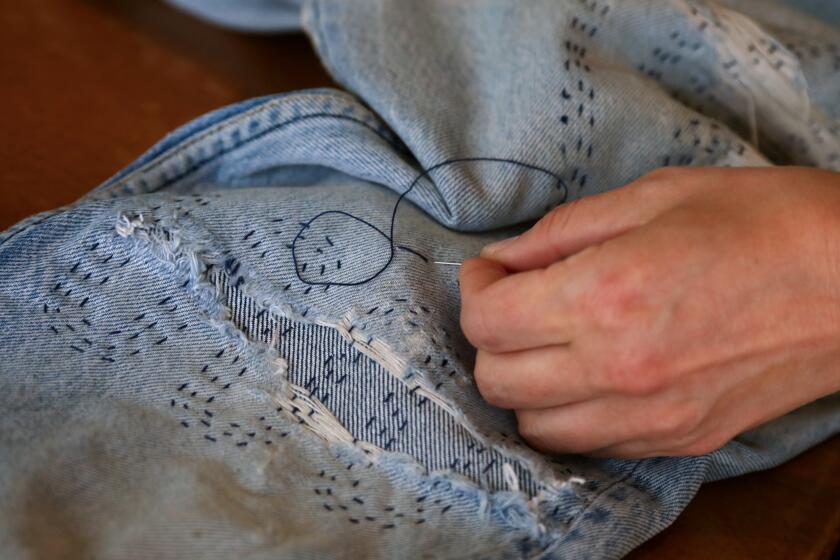In tony Malibu, $195 cargo pants aplenty, but nary a hammer or nail
To understand the changes roiling once-sleepy Malibu, check out the new $25-million shopping center that finally opens Saturday at the junction of Pacific Coast Highway and Cross Creek Road.
Shops such as James Perse and Tory Burch will sell $195 cargo pants and $310 sandals, along with gelato, cupcakes and dance lessons -- a far cry from the plywood and hammers sold at the Malibu Lumber Yard, which occupied the site for decades and will live on in the name of the shopping center.
At the Malibu Country Mart next door and Cross Creek Plaza across the street, rising rents and slumping sales are squeezing out mom-and-pop galleries, pet stores, hair salons and cobblers. Newer awnings trumpet names like Ralph Lauren and Juicy Couture.
The retailing ambience in Malibu, a city famed for its surfing and celebrities, is moving upmarket, and many Malibuites rue the prospect of having shops with $200 T-shirts but no one to resole their shoes.
“We’ll be like Aspen and Vail, with no local businesses serving the community,” said Jack Evans, a longtime resident. “We’re only going to get national brands that want Malibu on their masthead, along with Beverly Hills and New York.”
Steve Soboroff, a developer who sold Cross Creek Plaza two years ago, agrees that Malibu merchandising is “out of whack.”
“The tone,” he said, “needs to shift back a little from the classes to the masses.”
It was Dick Van Dyke, a fan of the old lumber yard who lives in the private Serra Retreat community, who brought the issue of underwear out of the closet.
In an acerbic letter to the Malibu Times, he told of having to drive to Agoura and Calabasas to shop for a screwdriver and underwear, basics he could not find in Malibu’s Civic Center area.
“It looks like a Rodeo Drive,” Van Dyke said in an interview. “It was a beach town. Now they’re trying to turn it into a resort.”
That disturbs Heather Anderson, a 20-year resident. Although she recognizes that the city needs sales tax dollars, Anderson said, “I hate to see Malibu become a shopping destination when it used to be a surfing-swimming-beachy destination.” Still, she welcomes the two new eateries that will be coming to the Malibu Lumber Yard shopping center, which she hopes will provide a safe hangout for her two teenagers.
The shopping center’s developers, both local residents, hope so too. The two-story, open-air center will feature a central deck with lounge chairs and hammocks for children’s activities, outdoor dining and wireless computer access. On the deck are three cylindrical saltwater aquariums featuring brilliant orange garibaldi imported from Mexico on a special permit and other species. An on-site “fish hospital” aims to ensure their health, said co-developer Richard Weintraub.
Weintraub’s partner in the venture is longtime friend Richard Sperber, co-chief executive of ValleyCrest Landscape Cos. in Calabasas, which is mostly owned by computer maven Michael S. Dell.
Both said building a “green” project -- with plants suited to the coastal climate, wood from sustainable forests and decomposed granite in the parking lot instead of asphalt -- was a top priority. The builders also noted that they used “materials once produced at the Malibu Lumber Yard.” Although they intended it as an homage to the beloved business, fans of the lumber yard, which closed a few years ago, view it as a mockery.
With no city wastewater system, Sperber and Weintraub had to build their own -- a $3.5-million operation that Weintraub said would make treated wastewater “cleaner than Fiji water.”
In addition to luring J. Crew and the first branch of Melrose Avenue’s celebrity-studded Maxfield clothing shop, the developers, at the city’s request, reduced rates for a few locally owned businesses. One is the Dance Star studio, which Weintraub said would be “a great driver” as parents shop and dine while their kids do plies.
Like other shopping center developers who paid high prices when the Malibu real estate market was buoyant, Sperber and Weintraub are motivated to reap as much rent money as they can. Each year, they will be on the hook for more than $1 million in payments to the city, which will use the funds to pay down the debt it incurred to buy the adjoining Legacy Park property -- long known to locals as the chili cook-off site.
Across PCH, Malibu Colony Plaza is also undergoing change. Four years ago, E. Stanley Kroenke, husband of a Wal-Mart heir, bought the center and began raising rents. Rather than fork over more for his lease, Wolfgang Puck closed his popular Granita restaurant. It remains deserted and, in one resident’s view, looks like a haunted mansion.
At the other end of PCH, in Malibu West, the Trancas Country Market is also slated for a dramatic makeover and expansion. After the new owners tripled his rent, Brian Pietro, owner of the Zuma Beach General Store, jettisoned the hardware he had sold and scaled down to the Beach Shack, selling T-shirts and beach gear.
Pietro said he applauds the proposal, soon to go before the city Planning Commission, for a “folksy and quaint” center with shops geared to residents. But he is skeptical.
“It’s a swell plan,” Pietro said, “but how is a little yogurt shop going to pay the rent they’ll have to charge?”
--




